For many prospective dog owners, the dream pet is one that brings joy without the constant hassle of shedding fur or excessive barking. If you’re envisioning a peaceful home with a cuddly companion, navigating the vast world of dog breeds can be overwhelming. Fortunately, there are many charming quiet small dog breeds that don’t shed that fit this ideal, offering a serene presence and minimal cleanup. These delightful canines are often perfect for apartment living, allergy sufferers, and anyone seeking a calm, low-maintenance friend. From their distinctive personalities to their specific grooming needs, understanding each breed is key to finding your perfect match.
Affenpinscher
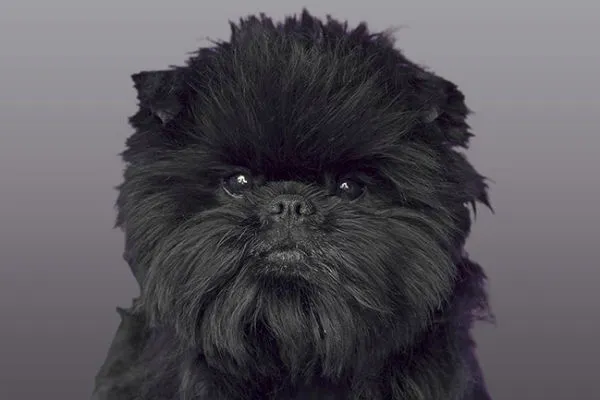 Affenpinscher dog looking curious with wiry black coat
Affenpinscher dog looking curious with wiry black coat
The Affenpinscher, whose name cleverly translates to “monkey-like terrier,” is a small but feisty dog that truly lives up to its moniker with its intelligent gaze and spirited nature. Despite their compact size, these toy breeds are remarkably fearless and possess an alert demeanor that makes them excellent watchdogs without being overly vocal. Their wiry, medium-length coat is one of their most appealing features, as it sheds very little and is also known for having almost no “doggy odor,” making them a fantastic choice for those sensitive to dog smells or looking for a list of small dogs that dont shed. Affenpinschers are generally quiet indoors, preferring to observe their surroundings with a keen eye rather than bark incessantly. A twice-weekly brushing with a slicker brush and comb is usually sufficient to keep their shaggy yet neat appearance, highlighting their low-maintenance grooming alongside their endearing sense of humor.
Basenji
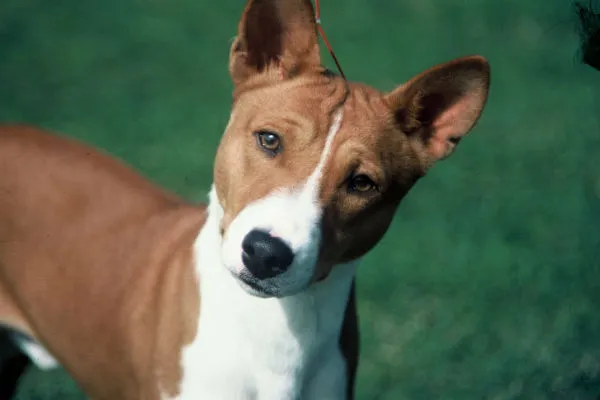 Basenji dog standing alert outdoors with smooth short brown and white coat
Basenji dog standing alert outdoors with smooth short brown and white coat
Often referred to as the “barkless dog,” the Basenji stands out as an exceptional choice for those seeking a quiet companion. While they don’t bark, they do make unique yodel-like sounds, adding to their distinct charm without the typical noise of many dog breeds. This characteristic, combined with their minimal shedding, makes them ideal for apartment dwellers or individuals who appreciate a peaceful home environment. Basenjis possess a short, fine coat that requires very little care beyond an occasional brushing, simplifying grooming routines significantly. For people who admire hounds but prefer to avoid their characteristic odor and shedding tendencies, the Basenji presents a sophisticated and low-maintenance option. Daily exercise and playtime are essential to keep these intelligent and energetic dogs content, ensuring a balanced temperament indoors.
Bichon Frise
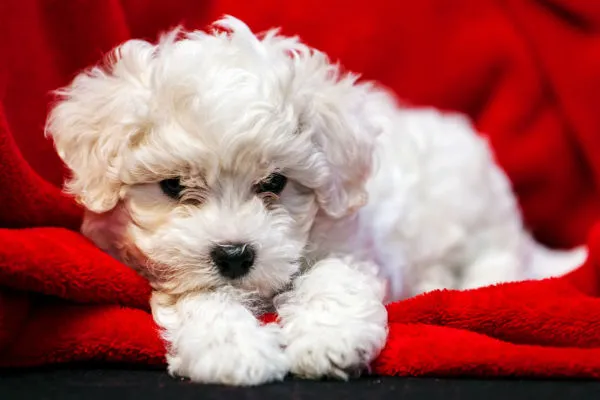 Fluffy white Bichon Frise dog with a playful expression
Fluffy white Bichon Frise dog with a playful expression
The Bichon Frise is celebrated as a genuinely non-shedding small dog breed, making them a top contender for individuals with allergies. These playful and affectionate dogs are known for their powder-puff appearance and joyous personalities. While they don’t shed, their continuous-growing hair does demand consistent maintenance. Regular grooming, frequent brushing, and routine baths are crucial to prevent matting and keep their pristine, fluffy coat looking its best. Despite the grooming commitment, their cheerful disposition and relatively quiet nature indoors make them wonderful companions. Bichons are generally adaptable and thrive on companionship, often content with indoor play and short daily walks, further contributing to their appeal as small family dogs that don don’t shed.
Bolognese
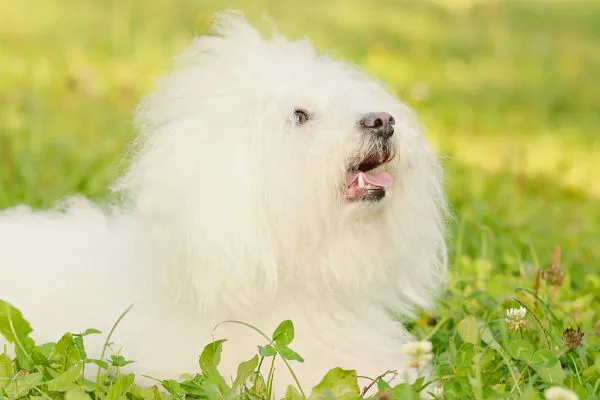 Bolognese dog with long, fluffy white coat sitting attentively
Bolognese dog with long, fluffy white coat sitting attentively
Much like their Bichon Frise cousins, the Bolognese boasts a distinctive fluffy coat that is composed of hair rather than fur, signifying their non-shedding quality. These lovable lap dogs are renowned for their calm and devoted temperament, making them exceptionally quiet and gentle companions. They thrive on human interaction and are typically not prone to excessive barking, fitting perfectly into quiet households. While they do not shed, their beautiful coat does require daily brushing to prevent tangles and remove any dead hair, ensuring they always look their best. The commitment to daily grooming is a small price to pay for a loyal, tranquil, and allergy-friendly canine friend. Their moderate exercise needs can usually be met with indoor play and short walks, making them suitable for various living situations, including apartments.
Brussels Griffon
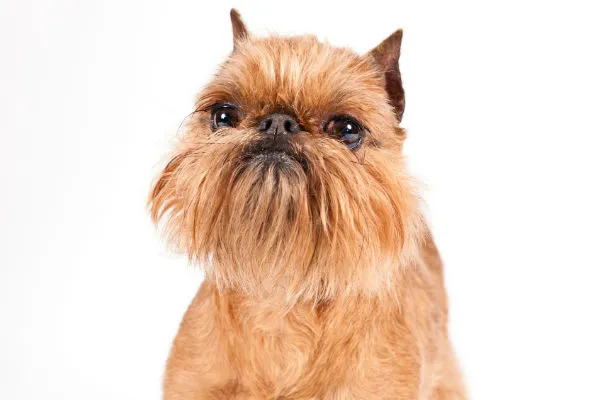 Brussels Griffon dog looking attentively with a scruffy brown coat
Brussels Griffon dog looking attentively with a scruffy brown coat
Don’t let the small stature of the Brussels Griffon fool you; these dogs are far from fragile and possess a robust personality. They come in both smooth-coated and rough-coated varieties, both of which are minimal shedders, offering a great option for those seeking less hair around the home. Brussels Griffons are typically alert and observant, but generally not excessively noisy, making them a good fit for quieter environments. Their loyalty and affectionate nature shine brightest when they are close to their families. Their small size means that a daily walk combined with indoor play is usually sufficient to meet their exercise requirements, making them well-suited for urban living. Regular grooming is essential for both coat types to keep them healthy and tidy, ensuring their unique charm is always on display.
Chinese Crested
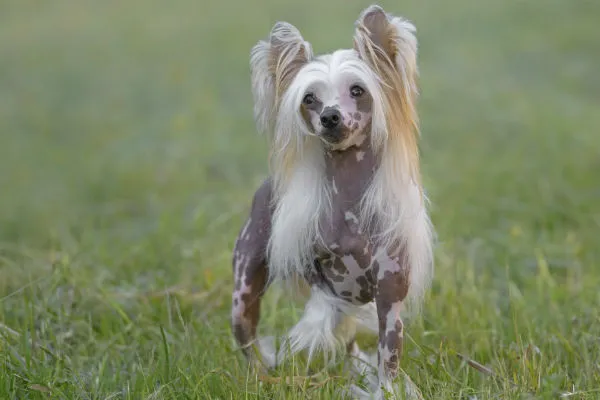 Hairless Chinese Crested dog with hair on head, tail, and paws
Hairless Chinese Crested dog with hair on head, tail, and paws
For the ultimate solution to shedding, the Chinese Crested offers a unique approach – often being a hairless dog breed. These striking dogs come in two distinct coat types: hairless and powderpuff. The hairless variety has hair only on their head, tail, and feet, ensuring virtually no shedding. The powderpuff, on the other hand, has a full coat of fine, soft hair that sheds very minimally. Both types are generally quiet, gentle, and affectionate, making them excellent indoor companions. However, hairless varieties demand extra care for their skin, requiring protection from sun exposure, cold temperatures, and potential irritations. Their calm demeanor and minimal barking tendencies make them a truly serene addition to any home, especially for those seeking distinct different types of small dogs that dont shed.
Coton De Tulear
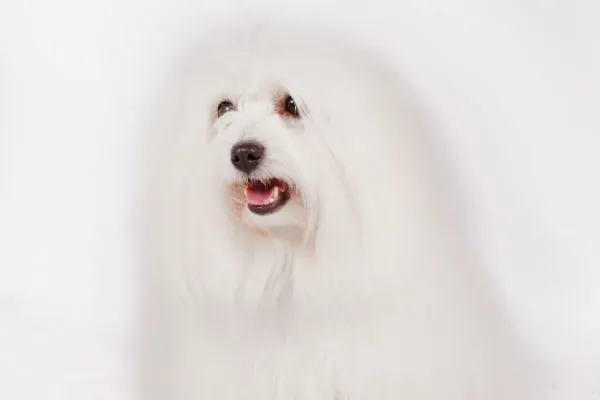 Coton de Tulear dog with long, soft white coat and a friendly expression
Coton de Tulear dog with long, soft white coat and a friendly expression
The Coton de Tulear, with its distinctive long, fluffy coat reminiscent of cotton (hence the name), is widely considered hypoallergenic, making it an excellent choice for allergy sufferers and those who want a small dog that simply doesn’t shed. These charming dogs are known for their lighthearted, gentle, and amiable personalities, bringing joy and a relatively quiet presence to their homes. Cotons are typically not big barkers, often preferring to express themselves through playful antics. While they are non-shedding, their beautiful coats do require daily grooming to prevent matting and keep them looking pristine. Despite the daily grooming commitment, their loving and adaptable nature makes the effort incredibly worthwhile for a devoted, calm, and relatively quiet companion.
Havanese
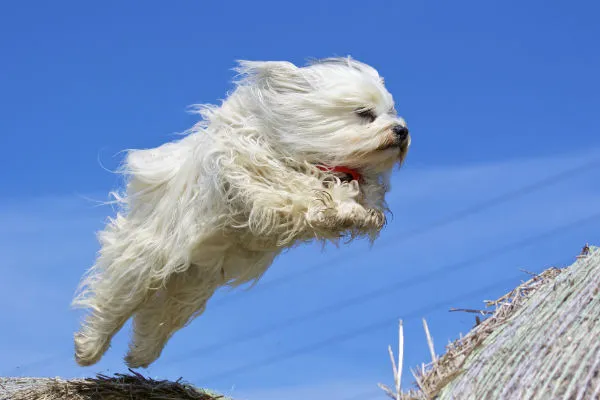 Havanese dog with long, flowing brown and white hair, looking playful
Havanese dog with long, flowing brown and white hair, looking playful
Native to Cuba, the Havanese combines patented spunky charm with a non-shedding coat, making them a delightful choice for those who desire less lint rolling and more playtime. These affectionate and outgoing dogs are surprisingly adaptable and generally not prone to excessive barking, especially with proper training and socialization. Their lively yet manageable energy levels mean they are typically quiet indoors, enjoying cozy naps as much as a good game. The Havanese’s flowing coat requires weekly brushing and regular baths to keep it clean, healthy, and free of tangles. Their compact size and adaptable nature make them ideal for apartment living, while their gentle disposition ensures they are wonderful companions for families and individuals alike, fitting the profile of small family dogs that don t shed.
Maltese
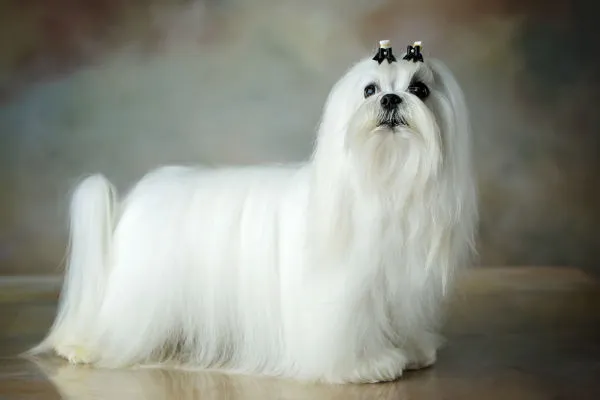 Maltese dog with long, silky white hair and a bow on its head
Maltese dog with long, silky white hair and a bow on its head
For three millennia, Maltese dogs have captivated humans with their elegance and charm. This ancient breed from Malta has maintained its allure partly due to its long, white, silky coat that sheds very little, solidifying its status as an ideal lap dog. Maltese are renowned for their gentle, sweet, and typically quiet temperament, making them wonderful indoor companions that rarely resort to excessive barking. Their calm demeanor perfectly complements their non-shedding qualities. While their coats are low-shedding, they do demand regular brushing to prevent mats and occasional baths to maintain their pristine appearance and remove any debris. Their serene presence and affectionate nature make the Maltese a truly timeless choice for those seeking a tranquil and elegant companion.
Lhasa Apso
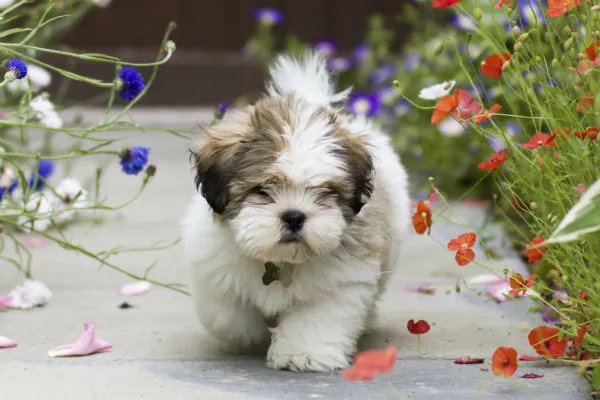 Lhasa Apso dog with long, flowing golden and white hair
Lhasa Apso dog with long, flowing golden and white hair
Originating from the monasteries of Tibet, the Lhasa Apso was bred to be an indoor sentinel, making them naturally alert but generally composed. While they can be protective, they are not typically yappy, especially when well-socialized, often emitting a deliberate bark only when necessary. This small dog breed makes an excellent companion, balancing a calm disposition with a playful side. Lhasa Apsos do not shed, but their magnificent long coats require significant maintenance to prevent matting. Many owners opt for a shorter “puppy cut” to simplify daily grooming and brushing. They enjoy brisk walks and are equally content resting in their owner’s lap, proving their adaptability as quiet and loyal house pets.
Miniature Schnauzer
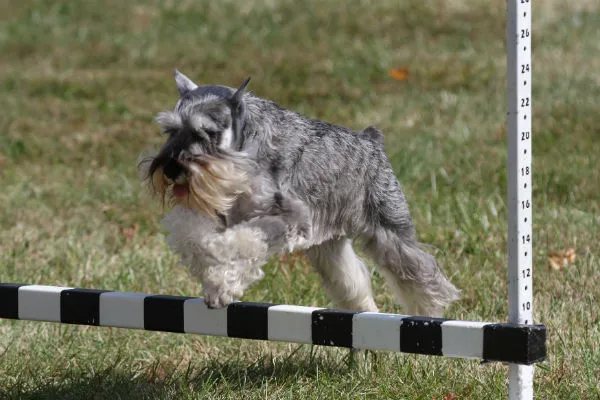 Miniature Schnauzer dog with classic salt-and-pepper coat and distinct eyebrows
Miniature Schnauzer dog with classic salt-and-pepper coat and distinct eyebrows
The Miniature Schnauzer is a smart, highly trainable, and cheerful little terrier known for its robust personality and distinctive appearance. While they are terriers and can have a natural alertness, Miniature Schnauzers are generally adaptable and can be quite quiet indoors when their exercise needs are met. They are minimal shedders, making them a good option for those seeking a clean home. Their wiry coat requires weekly brushing and regular professional grooming to maintain its iconic look. Their adaptability means they thrive equally in city apartments or country homes, as long as they are close to their human companions. Miniature Schnauzers are loyal and protective without being overly vocal, fitting well into families looking for an alert yet calm presence.
Poodle (Miniature and Toy)
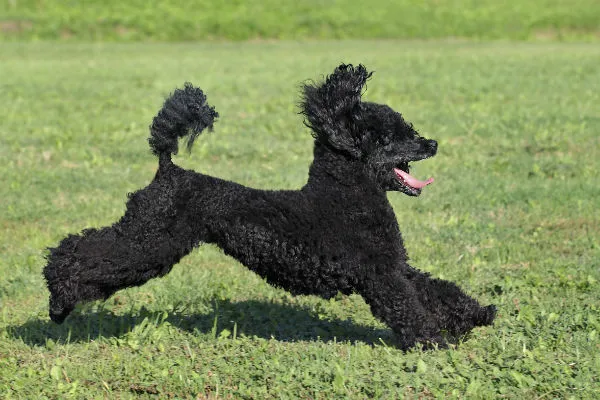 Standard Poodle dog with fluffy white coat standing gracefully
Standard Poodle dog with fluffy white coat standing gracefully
When thinking of dogs that don’t shed, Poodles are often the first breed that comes to mind, and for good reason. Miniature and Toy Poodles offer these coveted non-shedding and hypoallergenic qualities in intelligent, petite packages. They are renowned for their highly intelligent and trainable nature, making them generally well-behaved and manageable in terms of vocalization. While they can be active, they are typically quiet indoors, especially with adequate mental and physical stimulation. Their signature curly coats, however, do require regular professional grooming and daily brushing to prevent matting. Poodles are proud and active dogs, but their adaptable and calm demeanor makes them excellent companions for a variety of households, offering a blend of elegance, brains, and a quiet presence without the shedding.
Scottish Terrier
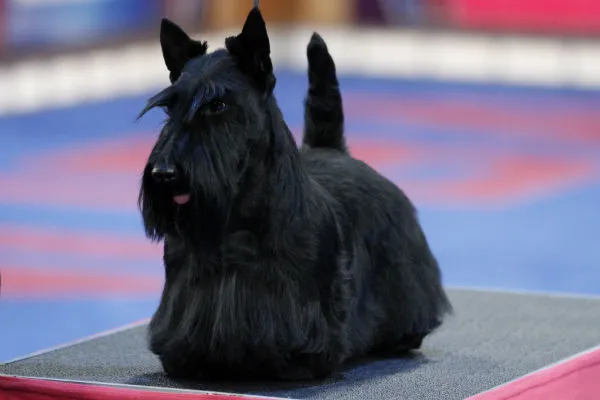 Scottish Terrier dog with wiry black coat and a bold stance
Scottish Terrier dog with wiry black coat and a bold stance
The Scottish Terrier, affectionately known as a Scottie, is a small terrier breed celebrated for its boldness, confidence, and surprisingly big personality. Despite their terrier roots, Scotties are often described as dignified and relatively quiet indoors, though they possess a keen alertness. Their wiry, weather-resistant coat is a major plus, as it sheds very little, making them a fantastic choice for those concerned about loose hair. To maintain their healthy coat and iconic silhouette, Scotties require regular brushing, grooming, and occasional hand-stripping. While clever and independent, their strong prey drive means careful supervision around smaller animals. Scotties are loyal companions who appreciate a routine and the comfort of their home, offering a quiet, steadfast presence without the mess of shedding.
Shih Tzu
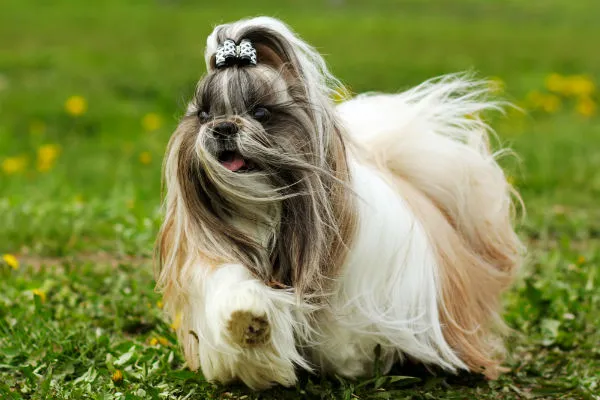 Shih Tzu dog with long, silky white and brown hair, looking regal
Shih Tzu dog with long, silky white and brown hair, looking regal
The Shih Tzu, a breed with a long and storied pedigree, was once the favored house pet of the Tang Dynasty in China. These “little lion dogs” are treasured for their long, silky hair that is very low-shedding and looks exceptionally regal when meticulously brushed. Beyond their stunning coats, Shih Tzus are known for their gentle, outgoing, and inherently trusting nature, making them exceptional companions. They were bred to be house pets and companions, which naturally predisposes them to being relatively quiet and adaptable to indoor living. While they can be playful, they are generally calm and content lap dogs, not typically prone to excessive barking. Their sturdy yet lively demeanor, combined with minimal shedding, makes them a wonderful addition to any home seeking a quiet, affectionate, and low-maintenance dog.
West Highland White Terrier
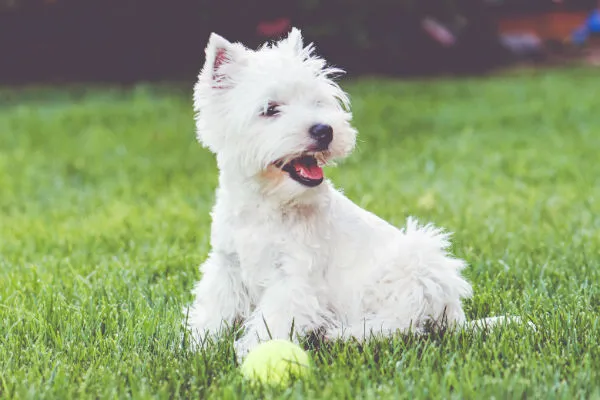 West Highland White Terrier dog with coarse white coat, looking curious
West Highland White Terrier dog with coarse white coat, looking curious
Affectionately known as Westies by their admirers, the West Highland White Terrier boasts a coarse, crisp white coat that sheds very little. These sturdy little dogs are intelligent, loyal, happy, and highly entertaining. While they possess an independent streak common among terriers, Westies are often described as having moderate energy levels and can be quite tranquil indoors when properly exercised. They are alert and will signal strangers, but are not usually considered excessive barkers unless bored or left alone for extended periods. Their minimal shedding coat requires regular brushing and occasional professional grooming to keep it in prime condition. Westies thrive on companionship and active engagement, making them a fantastic choice for families looking for a lively yet manageable and quiet, non-shedding companion.
Xoloitzcuintli (Mexican Hairless)
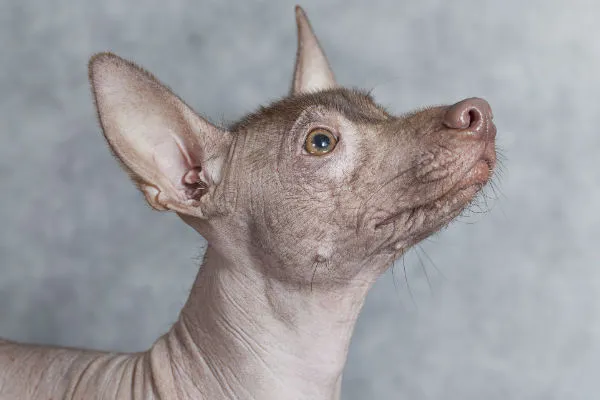 Hairless Xoloitzcuintli dog with dark skin, looking serene
Hairless Xoloitzcuintli dog with dark skin, looking serene
Also known as the Mexican Hairless, the Xoloitzcuintli is an ancient and rare breed available in both hairless and coated varieties, making them excellent choices for those specifically seeking small dog breeds that don’t shed hair. The hairless Xolo typically retains a small amount of hair on its head, while the coated variety sports a very short, fine coat that sheds minimally. Xolos are well-known for their tranquil personality around the home, making them exceptionally quiet and calm companions. They are attentive watchdogs but are not typically prone to nuisance barking. As with any hairless breed, the Xolo requires special attention to their skin, needing protection from the elements. They enjoy physical activities like walks and vigorous play but are equally content to relax at home, offering a unique blend of athleticism and serenity.
Yorkshire Terrier
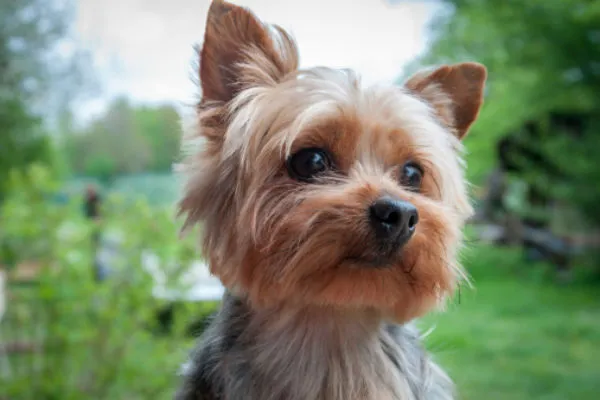 Yorkshire Terrier dog with long, silky black and tan hair
Yorkshire Terrier dog with long, silky black and tan hair
The Yorkshire Terrier, or Yorkie, is a sprightly, affectionate toy breed brimming with personality. Despite their regal appearance, Yorkies have working-class roots, originally hunting rats in English clothing mills, which showcases their fearless spirit. Today, they are just as happy lounging on a lap as they are exploring. Yorkies are one of the most popular breeds, partly because they do not shed, making them ideal for allergy sufferers. Their beautiful, silky coats are low-maintenance regarding shedding, though they require daily brushing to prevent tangles and maintain their luster. These intelligent dogs are adaptable and generally quiet indoors, often content with short bursts of play and cuddles. Their compact size, minimal shedding, and relatively calm indoor demeanor make them an excellent choice for those seeking a small, quiet, and devoted companion.
Beyond the Breeds: General Considerations for Quiet, Non-Shedding Dogs
While this guide highlights specific small quiet dog breeds that don’t shed, it’s important to remember that individual personalities vary, and proper training and socialization are crucial for any dog’s behavior. Breeds like those in the Terrier group, known for their wiry and coarse hair, often shed less than other breeds, offering numerous options for minimal shedding.
Choosing a non-shedding dog doesn’t mean zero maintenance. All dogs require care, including regular grooming, a high-quality diet, and routine veterinary checkups to ensure their health and happiness. When selecting your companion, always research thoroughly and consider a reputable breeder to ensure you bring home a healthy and well-adjusted puppy. Finding the right match for your lifestyle means understanding their exercise needs, grooming demands, and general temperament, ensuring a harmonious and quiet home for years to come.
